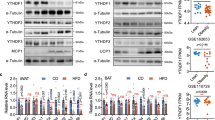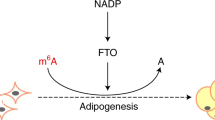Abstract
Background/objective:
N6-methyladenosine (m6A) modification of mRNA plays a role in regulating adipogenesis. However, its underlying mechanism remains largely unknown. Epigallocatechin gallate (EGCG), the most abundant catechin in green tea, plays a critical role in anti-obesity and anti-adipogenesis.
Methods:
High-performance liquid chromatography coupled with triple-quadrupole tandem mass spectrometry (HPLC–QqQ–MS/MS) was performed to determine the m6A levels in 3T3-L1 preadipocytes. The effects of EGCG on the m6A levels in specific genes were determined by methylated RNA immunoprecipitation coupled with quantitative real-time PCR (meRIP-qPCR). Several adipogenesis makers and cell cycle genes were analyzed by quantitative real-time PCR (qPCR) and western blotting. Lipid accumulation was evaluated by oil red O staining. All measurements were performed at least for three times.
Results:
Here we showed that EGCG inhibited adipogenesis by blocking the mitotic clonal expansion (MCE) at the early stage of adipocyte differentiation. Exposing 3T3-L1 cells to EGCG reduced the expression of fat mass and obesity-associated (FTO) protein, an m6A demethylase, which led to increased overall levels of RNA m6A methylation. Cyclin A2 (CCNA2) and cyclin dependent kinase 2 (CDK2) play vital roles in MCE. The m6A levels of CCNA2 and CDK2 mRNA were dramatically enhanced by EGCG. Interestingly, EGCG increased the expression of YTH N6-methyladenosine RNA binding protein 2 (YTHDF2), which recognized and decayed methylated mRNAs, resulting in decreased protein levels of CCNA2 and CDK2. As a result, MCE was blocked and adipogenesis was inhibited. FTO overexpression and YTHDF2 knockdown in 3T3-L1 cells significantly increased CCNA2 and CDK2 protein levels and ameliorated the EGCG-induced adipogenesis inhibition. Thus, m6A-dependent CCNA2 and CDK2 expressions mediated by FTO and YTHDF2 contributed to EGCG-induced adipogenesis inhibition.
Conclusion:
Our findings provide mechanistic insights into how m6A is involved in the EGCG regulation of adipogenesis and shed light on its anti-obesity effect.
This is a preview of subscription content, access via your institution
Access options
Subscribe to this journal
Receive 12 print issues and online access
$259.00 per year
only $21.58 per issue
Buy this article
- Purchase on Springer Link
- Instant access to full article PDF
Prices may be subject to local taxes which are calculated during checkout






Similar content being viewed by others
References
Kopelman PG. Obesity as a medical problem. Nature. 2000;404:635–43.
Kao YH,Chang HH,Lee MJ,Chen CL, Tea, obesity, and diabetes. Mol Nutr Food Res. 2006;50:188–210.
Lin JK, Lin-Shiau SY. Mechanisms of hypolipidemic and anti-obesity effects of tea and tea polyphenols. Mol Nutr Food Res. 2006;50:211–7.
Kao YH, Hiipakka RA, Liao S. Modulation of endocrine systems and food intake by green tea epigallocatechin gallate. Endocrinology. 2000;141:980–7.
Klaus S, Pultz S, Thone-Reineke C, Wolfram S. Epigallocatechin gallate attenuates diet-induced obesity in mice by decreasing energy absorption and increasing fat oxidation. Int J Obes. 2005;29:615–23.
Furuyashiki T, Nagayasu H, Aoki Y, Bessho H, Hashimoto T, Kanazawa K, et al. Tea catechin suppresses adipocyte differentiation accompanied by down-regulation of PPARgamma2 and C/EBPalpha in 3T3-L1cells. Biosci Biotech Bioch. 2004;68:2353–9.
Lin J, Della-Fera MA, Baile CA. Green tea polyphenol epigallocatechin gallate inhibits adipogenesis and induces apoptosis in 3T3-L1 adipocytes. Obes Res. 2005;13:982–90.
Wu BT, Hung PF, Chen HC, Huang RN, Chang HH, Kao YH. The apoptotic effect of green tea (-)-epigallocatechin gallate on 3T3-L1 preadipocytes depends on the Cdk2 pathway. J Agric Food Chem. 2005;53:5695–701.
Lee H, Bae S, Yoon Y. The anti-adipogenic effects of (-)epigallocatechin gallate are dependent on the WNT/beta-catenin pathway. J Nutr Biochem. 2013;24:1232–40.
Merkestein M, Laber S, McMurray F, Andrew D, Sachse G, Sanderson J, et al. FTO influences adipogenesis by regulating mitotic clonal expansion. Nat Commun. 2015;6:6792.
Jia G, Fu Y, Zhao X, Dai Q, Zheng G, Yang Y, et al. N6-methyladenosine in nuclear RNA is a major substrate of the obesity-associated FTO. Nat Chem Biol. 2011;7:885–7.
Fu Y, Dominissini D, Rechavi G, He C. Gene expression regulation mediated through reversible m(6)A RNA methylation. Nat Rev Genet. 2014;15:293–306.
Wu RF,Jiang DH,Wang YZ,Wang XX, N (6)-Methyladenosine (m(6)A) methylation in mRNA with A dynamic and reversible epigenetic modification. Mol Biotechnol. 2016;58:450–9.
Zhao X, Yang Y, Sun BF, Shi Y, Yang X, Xiao W, et al. FTO-dependent demethylation of N6-methyladenosine regulates mRNA splicing and is required for adipogenesis. Cell Res. 2014;24:1403–19.
Wang XX, Zhu LN, Chen JQ, Wang YZ. mRNA m(6)A methylation downregulates adipogenesis in porcine adipocytes. Biochem Bioph Res Co. 2015;459:201–7.
Fang MZ, Wang Y, Ai N, Hou Z, Sun Y, Lu H, et al. Tea polyphenol (-)-epigallocatechin-3-gallate inhibits DNA methyltransferase and reactivates methylation-silenced genes in cancer cell lines. Cancer Res. 2003;63:7563–70.
Balachandran A, Guan HY, Sellan M, van Uum S, Yang K. Insulin and dexamethasone dynamically regulate adipocyte 11 beta-hydroxysteroid dehydrogenase type 1. Endocrinology. 2008;149:4069–79.
Wang XX, Yu CH, Feng J, Chen J, Jiang Q, Kuang SH, et al. Depot-specific differences in fat mass expansion in WT and ob/ob mice. Oncotarget. 2017;8:46326–36.
Zheng GQ, Dahl JA, Niu YM, Fedorcsak P, Huang CM, Li CJ, et al. ALKBH5 Is a mammalian RNA demethylase that impacts rna metabolism and mouse fertility. Mol Cell. 2013;49:18–29.
Dominissini D, Moshitch-Moshkovitz S, Schwartz S, Salmon-Divon M, Ungar L, Osenberg S, et al. Topology of the human and mouse m6A RNA methylomes revealed by m6A-seq. Nature. 2012;485:201–6.
Kao SH, Wang WL, Chen CY, Chang YL, Wu YY, Wang YT, et al. Analysis of protein stability by the cycloheximide chase assay. Bio Protoc. 2015;5:e1374.
Wang X, Lu Z, Gomez A, Hon GC, Yue Y, Han D, et al. N6-methyladenosine-dependent regulation of messenger RNA stability. Nature. 2014;505:117–20.
Gregoire FM, Smas CM, Sul HS. Understanding adipocyte differentiation. Physiol Rev. 1998;78:783–809.
Tang QQ, Otto TC, Lane MD. Mitotic clonal expansion: a synchronous process required for adipogenesis. Proc Natl Acad Sci USA. 2003;100:44–9.
Tang QQ, Otto TC, Lane MD. CCAAT/enhancer-binding protein beta is required for mitotic clonal expansion during adipogenesis. Proc Natl Acad Sci USA. 2003;100:850–5.
Nigg EA. Cyclin-dependent protein kinases: key regulators of the eukaryotic cell cycle. Bioessays. 1995;17:471–80.
Li X, Kim JW, Gronborg M, Urlaub H, Lane MD, Tang QQ. Role of cdk2 in the sequential phosphorylation/activation of C/EBPbeta during adipocyte differentiation. Proc Natl Acad Sci USA. 2007;104:11597–602.
Lee MJ, Wang ZY, Li H, Chen L, Sun Y, Gobbo S, et al. Analysis of plasma and urinary tea polyphenols in human subjects. Cancer Epidemiol Biomark Prev. 1995;4:393–9.
Moroy T, Geisen C, Cyclin E. Int J Biochem Cell Biol. 2004;36:1424–39.
Liu J, Yue Y, Han D, Wang X, Fu Y, Zhang L, et al. A METTL3-METTL14 complex mediates mammalian nuclear RNA N6-adenosine methylation. Nat Chem Biol. 2014;10:93–5.
Wang X, Zhao BS, Roundtree IA, Lu Z, Han D, Ma H, et al. N(6)-methyladenosine Modulates Messenger RNA Translation Efficiency. Cell. 2015;161:1388–99.
Shi H, Wang X, Lu Z, Zhao BS, Ma H, Hsu PJ, et al. YTHDF3 facilitates translation and decay of N6-methyladenosine-modified RNA. Cell Res. 2017;27:315–28.
Li A, Chen YS, Ping XL, Yang X, Xiao W, Yang Y, et al. Cytoplasmic m6A reader YTHDF3 promotes mRNA translation. Cell Res. 2017;27:444–7.
Murase T, Misawa K, Haramizu S, Hase T. Catechin-induced activation of the LKB1/AMP-activated protein kinase pathway. Biochem Pharmacol. 2009;78:78–84.
Wu W, Feng J, Jiang D, Zhou X, Jiang Q, Cai M, et al. AMPK regulates lipid accumulation in skeletal muscle cells through FTO-dependent demethylation of N(6)-methyladenosine. Sci Rep. 2017;7:41606.
Tachibana H, Koga K, Fujimura Y, Yamada K. A receptor for green tea polyphenol EGCG. Nat Struct Mol Biol. 2004;11:380–1.
Ku HC, Chang HH, Liu HC, Hsiao CH, Lee MJ, Hu YJ, et al. Green tea (-)-epigallocatechin gallate inhibits insulin stimulation of 3T3-L1 preadipocyte mitogenesis via the 67-kDa laminin receptor pathway. Am J Physiol Cell Physiol. 2009;297:C121–32.
Acknowledgements
This work was supported by the National Natural Science Foundation of China (Grant No. 31572413) and the Special Fund for Cultivation and Breeding of New Transgenic Organism (No. 2014ZX0800949B).
Author information
Authors and Affiliations
Corresponding authors
Ethics declarations
Conflict of interest
The authors declare that they have no conflict of interest.
Electronic supplementary material
Rights and permissions
About this article
Cite this article
Wu, R., Yao, Y., Jiang, Q. et al. Epigallocatechin gallate targets FTO and inhibits adipogenesis in an mRNA m6A-YTHDF2-dependent manner. Int J Obes 42, 1378–1388 (2018). https://doi.org/10.1038/s41366-018-0082-5
Received:
Revised:
Accepted:
Published:
Issue Date:
DOI: https://doi.org/10.1038/s41366-018-0082-5
This article is cited by
-
RNA modifications in cellular metabolism: implications for metabolism-targeted therapy and immunotherapy
Signal Transduction and Targeted Therapy (2024)
-
Using integrated analysis from multicentre studies to identify RNA methylation-related lncRNA risk stratification systems for glioma
Cancer Cell International (2023)
-
RNA m6A methylation regulators in sepsis
Molecular and Cellular Biochemistry (2023)
-
m6A modification: recent advances, anticancer targeted drug discovery and beyond
Molecular Cancer (2022)
-
DHA alleviates diet-induced skeletal muscle fiber remodeling via FTO/m6A/DDIT4/PGC1α signaling
BMC Biology (2022)



